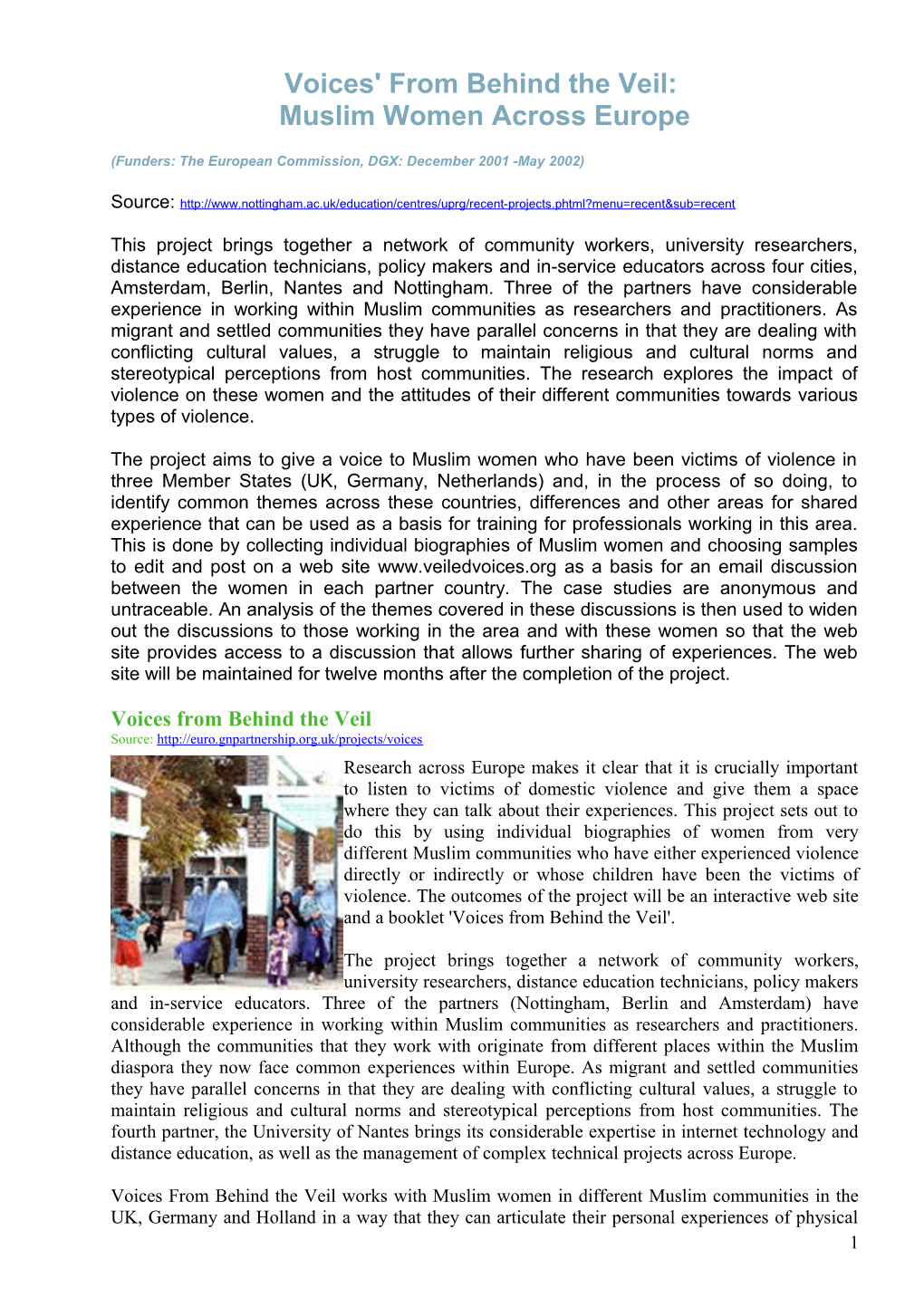Voices' From Behind the Veil:
Muslim Women Across Europe
(Funders: The European Commission, DGX: December 2001 -May 2002)
Source:
This project brings together a network of community workers, university researchers, distance education technicians, policy makers and in-service educators across four cities, Amsterdam, Berlin, Nantes and Nottingham. Three of the partners have considerable experience in working within Muslim communities as researchers and practitioners. As migrant and settled communities they have parallel concerns in that they are dealing with conflicting cultural values, a struggle to maintain religious and cultural norms and stereotypical perceptions from host communities. The research explores the impact of violence on these women and the attitudes of their different communities towards various types of violence.
The project aims to give a voice to Muslim women who have been victims of violence in three Member States (UK, Germany, Netherlands) and, in the process of so doing, to identify common themes across these countries, differences and other areas for shared experience that can be used as a basis for training for professionals working in this area. This is done by collecting individual biographies of Muslim women and choosing samples to edit and post on a web site as a basis for an email discussion between the women in each partner country. The case studies are anonymous and untraceable. An analysis of the themes covered in these discussions is then used to widen out the discussions to those working in the area and with these women so that the web site provides access to a discussion that allows further sharing of experiences. The web site will be maintained for twelve months after the completion of the project.
Voices from Behind the Veil
Source:
Research across Europe makes it clear that it is crucially important to listen to victims of domestic violence and give them a space where they can talk about their experiences. This project sets out to do this by using individual biographies of women from very different Muslim communities who have either experienced violence directly or indirectly or whose children have been the victims of violence. The outcomes of the project will be an interactive web site and a booklet 'Voices from Behind the Veil'.
The project brings together a network of community workers, university researchers, distance education technicians, policy makers and in-service educators. Three of the partners (Nottingham, Berlin and Amsterdam) have considerable experience in working within Muslim communities as researchers and practitioners. Although the communities that they work with originate from different places within the Muslim diaspora they now face common experiences within Europe. As migrant and settled communities they have parallel concerns in that they are dealing with conflicting cultural values, a struggle to maintain religious and cultural norms and stereotypical perceptions from host communities. The fourth partner, the University of Nantes brings its considerable expertise in internet technology and distance education, as well as the management of complex technical projects across Europe.
Voices From Behind the Veil works with Muslim women in different Muslim communities in the UK, Germany and Holland in a way that they can articulate their personal experiences of physical or emotional violence while preserving their particular needs of anonymity and confidentiality, showing how Muslim women in different European countries deal with, and challenge acts of violence directed towards them, the impact of violence and its tolerance both within Muslim communities and wider societies. The work also looks at how these women can be supported by others both within their own communities and outside of it and highlights generational shifts and attitudes towards violence directed at women amongst the male members of these different communities.
For more information, contact: Kaye Haw, School of Education, The University of Nottingham, Jubilee Campus, Wollaton Road, Nottingham, NG8 1BB
Tel: 0115 951 4510
Email:
------
Source:
"Voices From Behind the Veil: Muslim Women Across Europe"
This project brings together a network of community workers, university researchers, distance education technicians, policy makers and in-service educators who have considerable experience in working within Muslim communities as researchers and practitioners. Although the communities that they work with originate from different places
they face common experiences within Europe in that they are dealing with conflicting cultural values, a struggle to maintain religious and cultural norms and stereotypical perceptions from host communities.
The most recent research points to our lack of understanding of issues of violence and highlights five key points:
/ The dishonour and rejection faced by Muslim women within their own community if their marriages failed, even if this was a result of domestic violence/ Problems with language and lack of knowledge of their rights and restrictions on their personal freedom outside the family home making it difficult to seek help from agencies
/ The fear of deportation
/ The need for further work about the extent and nature of domestic violence within all minority ethnic communities to evaluate the ability of outside agencies to respond equally to the needs of all groups
/ That it is vital that we listen to victims and give them a space where they can talk about their experiences.
The project sets out to explore these issues by using individual biographies of Muslim women from three very different Muslim communities in Amsterdam, Berlin and Nottingham who have either experienced violence directly or indirectly or whose children have been the victims of violence. Their biographies have then been written up as case studies. A selection of these biographical case studies have then been anonymised and posted on these web pages as a basis for interactive discussions firstly between the partner groups of Muslim women and then through a wider public debate with workers and professionals. Using these biographies and the resulting discussions the project this year aims to maintain and run this web site and produce a booklet to go with it called "Voices from Behind the Veil" based on the case studies and the resulting discussions.
1
